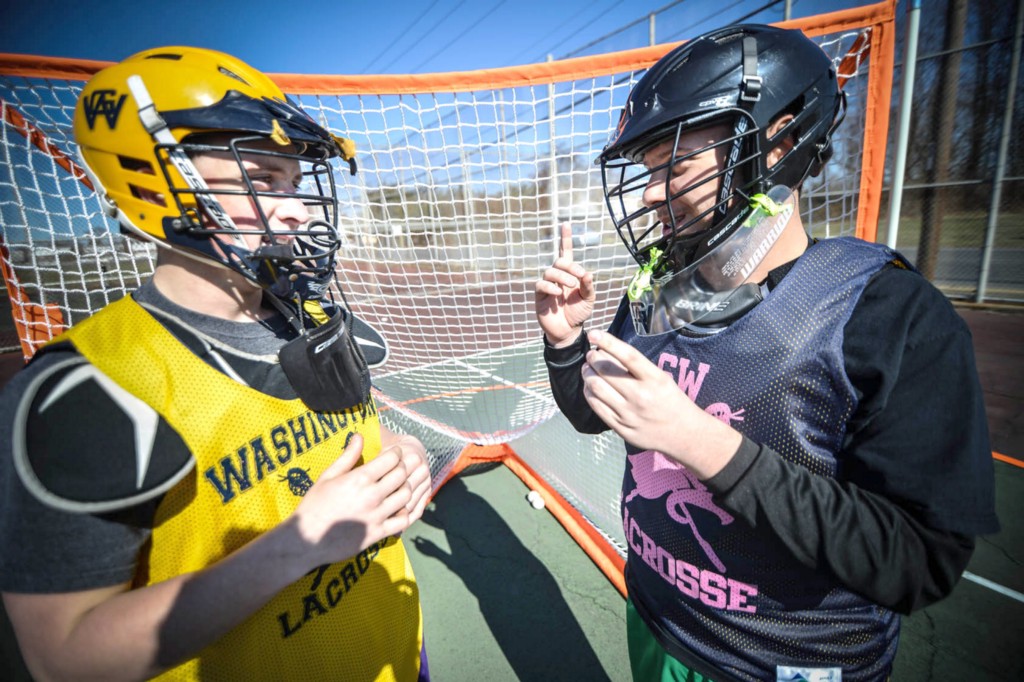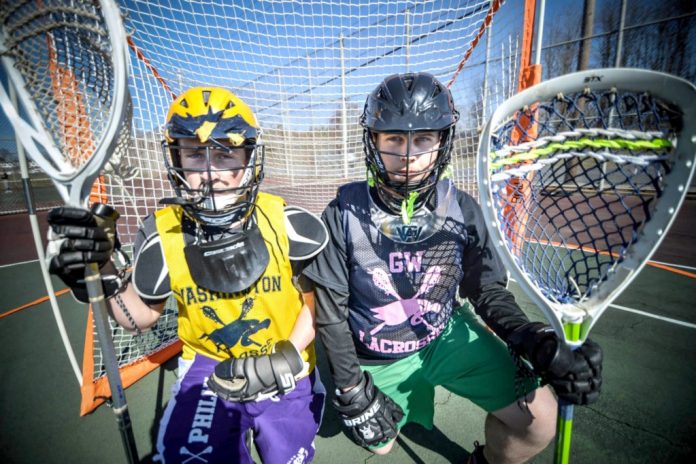Dynamic duo: Franklin (left) and Thiergartner have known each other since the fourth grade, but this year represents the first time they’ve played together on the same team. John Creighton has used both of his goaltenders in net so far.
What are the odds?
It’s a question George Washington High School head boys lacrosse coach John Creighton has been asking himself every day of the 2014 campaign so far. And while the season is still in its infancy stages, there’s a closeness to this Eagles team that has made their bond together stronger than oak.
There’s a reason for that.
You see, Washington sophomore goalie Paul Thiergartner is 100 percent deaf; normally, this might place a major hindrance on intra-team communication, but it just so happens that the Eagles’ other goaltender, junior Robert Franklin, knows American Sign Language due to the fact that both of his parents, as well as his sister, are hearing impaired. Whether it was kismet or just a stroke of good luck, all of the variables to this equation have lined up perfectly through the first three games, two of them Washington wins.
“If you would have asked me five years ago if he’d mean anything in my life, I would have probably said no,” said Franklin in regards to Thiergartner, whom he’s known since fourth grade when their families attended the same church. “I wouldn’t have ever expected this to happen, but he’s a good person. I like sharing things and helping people, it makes me feel good. He’s my friend, and I enjoy it because I’m helping somebody do better, you know?”
Thiergartner attends school at The Arts Academy at Benjamin Rush, but since the school does not have a lacrosse team, a partnership exists with Washington to allow Rush students to go out for sports for the Eagles. (In fact, Creighton has kids on his team from five other schools in addition to G.W.)
Franklin, who excelled when thrust into goal for Creighton in the Public League title game his freshman year, is a respected leader, so it’s no surprise he’s taken on the responsibility of making Thiergartner feel part of the family despite being unable to communicate with his coach and teammates through traditional speech.
“I’m just helping him feel like he belongs,” Franklin said. “People think that because he’s deaf he can’t play lacrosse, but he can play. I’m here for him. It’s not a burden at all.”
During a joint interview after Friday’s 14–1 shellacking of West Philadelphia in which each goalie played a half, Franklin acted as Thiergartner’s interpreter, listening to a reporter’s question before signing it to Thiergartner, who in turn signed his answer back to Franklin, who annuciated it. The process, though not without some kinks, is effective enough with some patience, which is certainly the path Washington’s season seems to be headed down.
It’s been a constant learning process, but in a good way. Creighton estimates he’s learned “eight to ten” words he can comfortably use when Franklin isn’t around as a safety valve, and text messaging, email and Facebook still serve as a crutch when in doubt. But despite some speed bumps along the way, the easiest way to figure out how it’s been going is to take one look at the enthusiastic smile plastered all over Thiergartner’s face.
“On older teams I played on I just didn’t like it, because I couldn’t communicate with anyone,” he said. “It’s a long process, but right now it’s going well. The team has always been there for me. Everyone has opened up and been really nice. I feel great.”
When he first got to Rush, Thiergartner was a bit timid at the outset, but small classroom sizes and a culture that facilitates acceptance at the school got him to come out of his shell, and fast. He signed up for everything he could find, including baseball and intramural soccer. It wasn’t always that way, as Thiergartner’s shyness was a byproduct of being bullied and teased growing up due to the fact that he couldn’t hear.
“I think once he came here, he saw that people either accepted him or left him alone,” said Rush athletic director Todd Corabi, who encouraged Thiergartner to go out for the Washington lacrosse team this season. “Now, he was accepted for who he was, instead of people saying, ‘Oh, he’s different.’ After a couple of days, he came back and said Creighton was going to keep him around. The smile was ear-to-ear. After that first day of fear, he just embraced it, and now he’s living his life the way anyone should.”
In lacrosse, the goalie tends to be the loudest player on the field, barking out movement and positioning instructions throughout the game. Since Thiergartner cannot do this, Washington has had to adapt.
“It’s actually made us collectively better, because now the rest of them all have to talk more,” Creighton said. “It hasn’t hurt us. And you wouldn’t even know Paul is hearing impaired with the group we have. We don’t have any issues welcoming in new players, and part of that is because Bob (Franklin) is so respected by his teammates. It’s a whole other commitment for him, to take on another full-time job. In addition to being my starting goalie, he’s also my interpreter. And it hasn’t been stressful at all.”
Franklin is just a junior, so he’s got plenty of time to keep teaching sign language to Creighton and his teammates before he graduates. His one hope is that Thiergartner’s success shows other kids with impairments or disabilities or just things about them that makes them different that in the end, whatever it may be, is not what defines them as people.
“I hope my mark leaves an imprint, one that shows teams that just because my friend is deaf, doesn’t mean he can’t play,” Franklin said. “That goes for anyone. It just doesn’t matter.”
“They’re all learning sign language and are all willing to be my brothers,” Thiergartner said. “I have a lot of fun, and I look forward to having a lot more of it. I love the team. It’s almost like it was meant to be, in a way.”
Corabi, the Rush AD, couldn’t be happier for his student. Educators are constantly combating bullying on the front lines in an effort to help their students fit in and find areas in which they thrive, so seeing Thiergartner be accepted so unconditionally at Washington has brought him joy.
“He’s a genuinely nice kid,” Corabi said. “It’s blessed my heart for him to be able to have this opportunity, even if it’s not at Rush. He’s just a nice boy, and whenever he sees something is wrong, he wants to help. It’s good to see that he gets something he wants for a change. He’s finding his way. It’s been a match made in heaven.”
And if he ever stumbles along the way, his teammates will have his back.
“Sometimes it can be difficult,” said senior captain Kevin Freeman. “I’ll find myself yelling at him to throw me the ball before realizing, ‘Oh yeah, he can’t hear me.’ We’re all still learning how to communicate with one another. Bob is doing a great job being a leader and showing us how to do the hand signs. At Washington, we respect our goalies. Without them, we wouldn’t be a team.”
Which, really, is all Thiergartner had ever hoped for: to be a part of a team.
“They’ve accepted me and welcomed me,” he said. “It makes me feel like I’m involved in a family.” ••
Editor’s note: In the print edition of this story, Robert Franklin was incorrectly identified as Robert Hoffman. A correction will be printed in next week’s edition of the Northeast Times.

Communication is key: Washington sophomore goalie Paul Thiergartner (right), a student at Rush, has been welcomed by his new teammates. They communicate through fellow goaltender Robert Franklin (left), whose parents and sister are also deaf. MARIA POUCHNIKOVA / TIMES PHOTOS





